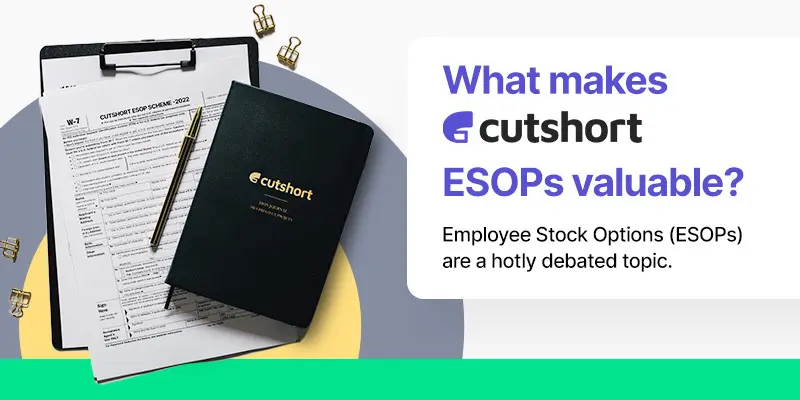Employee Stock Options (ESOPs) are a sensationalized buzzword in the startup ecosystem today and their significance as compared to cash components is often a topic of debate.
Most compensation experts advise candidates to trade ESOPs for more cash, while we have clearly seen how employees have become billionaires because of ESOPs.
The relationship of Startups and ESOPs
To succeed, startups need the best quality talent. This talent has the option of working in an established company but a lot of them prefer startups for holistic learning opportunities and faster career growth.
Money is essential, the startups also get it! They can’t beat the big established companies who pay huge salaries along with fancy monetary perks and benefits.
However, startups have the power of ESOPs in their hands. Hence, they offer ESOPs and make employees partners in their long-term growth of the company.
If ESOPs are so good, why don’t people generally value them?
The compensation experts aren’t really wrong asking you to trade ESOPs for cash. They definitely have concrete reasons for the same. ESOPs have, in general, failed to result in any substantial financial gains at most companies. Here are the main reasons:
- 90% of the startups fail. They may raise funding but very few are able to find a validated business model.
- Successful startups are often unable to give an opportunity for employees to sell their shares (however, this is changing fast since many companies/founders are now buying back employee shares)
- Employee shares lose value after multiple rounds of funding, especially when the terms are not friendly for employees (hence, the quality of ESOPs policy is a very important factor).
With this background, let me explain our ESOP policy at Cutshort and why we believe they are actually valuable to our employees.
Also Read: ESOPs: Understanding stock options in startup companies
At Cutshort, the overall growth of every team member is our key goal
The success of a startup depends largely on the team and culture. Google, Facebook, Apple, and Netflix are all hiring similar people – but the incentives and culture make their products and companies so different. Yet, while it’s the employees that create almost all the value at the company, they often only get a fraction of the value back in the form of cash salaries. Most of the riches go to investors and founders.
That’s why at Cutshort, we think deeply about the financial well-being of our team members.
- We pay them maximum salaries based on the value they bring. We don’t ask about their current or expected CTC, and don’t care about their location, gender, or years of experience.
- We offer ESOPs to each and every employee to share the upside of the company’s growth with them.
- We offer more ESOPs to those who continue to adopt an “owner” mindset vs an “employee” mindset.
- We try to do buybacks to actually give employees money when they need it. (We have already done it for our employees, read about it below)
Also Read: Are ESOPs going to make you rich?
Why do we strongly believe our ESOPs are very valuable?
- You are getting shares of a profitable, market-leading company with a realistic valuation. First off, Cutshort is a profitable company with a validated business model. We have reached 20,000+ companies, ~2000 of which have bought our product with real money to solve their hiring problems.
- The valuation of the company at which you will get ESOPs is realistic since it’s based on the revenue numbers. (For the startup-oriented folks: at our current 10cr/year revenue rate, the valuation of Cutshort is realistically determined at 25x multiple, or at INR 250cr. Contrast this with Cred which did 100cr revenue in 2021 and is currently valued at 350x revenue multiple).
Further, we offer ESOPs to employees at the price of just INR 1/- and while calculating the numbers of shares, use a 50% discount to the current valuation.
How does this matter?
- For the same value of the ESOP grant (let’s say INR 50 lakhs), you will get shares of a company with less market risk and a much higher growth potential.
- Cutshort is a marketplace whose valuation will increase much faster as it gains more traction. Unlike SaaS companies such as FreshWorks, Cutshort is a marketplace company such as LinkedIn or Airbnb. Marketplaces take more time to grow but once grown, their valuation rises much faster than those of SaaS companies. This is the reason why marketplace companies enjoy a high valuation of 50x to 100x their revenue while SaaS companies are more like 15x to 30x.
In the last 3 years, Cutshort’s valuation has grown from 40cr to 250cr. Thanks to this growth, we have several team members who joined as freshers in 2020 and now have ESOPs that are valued at more than INR 50 Lakhs.
But the best part? This is just the start. As the Cutshort marketplace increases its footprint, the revenues are expected to increase at an even faster rate. - Cutshort has the actual intention to share wealth with employees. As mentioned above, at Cutshort, we believe that it’s the team that makes a startup successful. So, sharing the wealth with them as Cutshort keeps growing isn’t benevolence, it’s basic fairness.
Although we have been a revenue-funded company, we still have already bought back ESOPs from the employees who needed financial help.
- We did it the first time in 2020 when we gave an exit of INR 1 Crore to an engineer we had hired as a fresher in 2016.
- We did it again in 2021 when we gave an exit of INR 3 Lakhs to a team member who needed money for a medical emergency at home.
How do you decide if a company’s ESOPs are actually valuable?
Many companies now offer stock-based compensation, which is great news. But not all ESOPs are equal in terms of their financial potential. You need to ask
- Is this company’s valuation realistic? Or it looks to be hyped up due to investors’ appetite? If you get shares at a high valuation, your returns might be limited.
- Does the company have a validated business model? Many startups don’t even after raising many rounds of funding and this means ESOP holders will not make any money.
- Most important – Does the company have the intent to share wealth with its employees? Are ESOPs just a “nice thing to do”?
Based on what we shared in this article, I assume you would find Cutshort’s ESOPs to be really valuable and a lifetime opportunity to reap good financial rewards in the long term.


